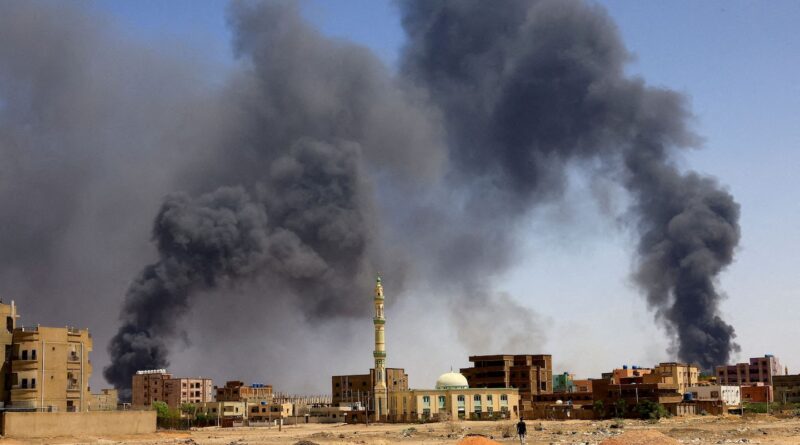Sudanese stuck in war zone after U.S. destroyed their passports
The U.S. Embassy “tied our hands and put us in hell,” the 59-year-old Sudanese national said. “I feel we are not treated as human beings.”
Others found themselves in the same bind: The U.S. State Department confirmed in a statement that diplomats destroyed an unspecified number of passports before evacuating the country last month.
“It is standard operating procedure during a drawdown to take precautions to not leave behind any documents, materials, or information that could fall into the wrong hands and be misused,” stated the email Alhajaa received.
The decision has ignited a firestorm of anger and fear among some Sudanese people at home and abroad, accusing Washington of taking a callous approach that put people in harm’s way, rather than doing more to try to return documents safely or provide an alternative.
In March, Alhajaa’s family had given the embassy their passports in the last leg of a years-long U.S. visa application process. The kids couldn’t wait.
The news that the passports had been destroyed in April shattered their hopes. What hurt most, he said, was that Washington had not offered a solution to the mess in which it had left his family.
The U.S. Embassy shut its doors April 15, after fighting broke out between rival generals. Deadly violence and a humanitarian crisis have devastated the nation of some 45 million people. Nearly all public services have been shut down, including the Sudanese passport agency — which would be able to issue new documents.
“The U.S. Embassy evacuated their people and left us to our destiny,” said Ibrahim Mohamed, 27, a software engineer in Khartoum whose passport was destroyed. He was in the application process for a student visa. “They seem like they don’t care about us at all. They are not even responding to our emails or phone calls.”
“I don’t ask for much,” he said. He has been living for weeks without electricity or stable access to food and water. His family members have fled Egypt — but he still cannot. “I just want my passport back or any travel document to travel to a safer place out of the danger zone.”
The State Department did not respond to questions about the specifics of the policy. “Because the security environment did not allow us to safely return those passports, we followed our procedure to destroy them rather than leave them behind unsecured,” said State Department deputy spokesman Vedant Patel.
“We recognize that the lack of travel documentation is a burden for those seeking to depart Sudan,” Patel said. “We have and will continue to pursue diplomatic efforts with partner countries to identify a solution.”
Even before the latest conflict, services at the embassy had been cut back and backlogged since the pandemic. A Sudanese national living in the United States, who spoke on the condition of anonymity to protect his visa status, said he was lobbying congressional representatives on behalf of 10 individuals and families who had also learned that their passports were destroyed.
Many governments evacuated their diplomats around the time Washington did. Some left passports locked inside emptied embassies, still unreachable by their desperate owners.
Since March, more than 200,000 people have fled Sudan, most by foot, to neighboring countries — and far more have been internally displaced, according to the U.N. refugee agency.
The French Embassy also destroyed the passports in its custody.
A French Foreign Ministry official, who spoke on the condition of anonymity under agency protocol, said that French diplomats destroyed “all documents held by the embassy containing personal data … as soon as their integrity could no longer be guaranteed.”
The policy is not without precedent: Officials at the U.S. Embassy in Kabul also shredded passports in the chaotic evacuation as the Taliban retook the country in 2021. The Taliban has targeted Afghans with connections to the United States, but the policy caused outrage among Afghans trying to leave the country.
Emma DiNapoli, a London-based war crimes expert focused on Sudan, said there was little likelihood that Sudanese applying for U.S. visas would be threatened by the two warring parties, both of which have taken part in ongoing cease-fire negotiations involving the United States.
“Governments worked so hard to extract their own citizens from the country, clearly realizing how dire the situation is and can get, and then haven’t taken other steps as we’ve seen in Ukraine,” such as creating alternative documents and visa-waiver plans, she said.
In the weeks since the international community left Sudan, passports held at the Chinese and Spanish embassies have been retrieved by their owners — under divergent circumstances.
In late May, after lobbying higher-ups, Sudanese workers at the Chinese Embassy received permission to set up distribution points around the city. When fighting lulled, people came to collect their documents.
Over the weekend, looters appear to have raided the Spanish Embassy in Khartoum and seized passports, according to some reports shared on social media, which could not immediately be verified. It remains unclear who breached the embassy and what was taken. A spokesman for the Spanish Foreign Ministry, who spoke on the condition of anonymity under agency protocol, did not deny the reports but said by email that officials “cannot confirm the status of the Spanish Embassy due to the lack of reliable information.”
Mahir Elfiel, 40, told The Washington Post on Tuesday that he had received his passport back from the Spanish Embassy that morning after paying a man he found on Facebook around $30 to retrieve it for him. Within hours, Elfiel departed for the Egyptian border.
“I am just blessed that I have my passport in my hand,” he said.
Alhajaa, for his part, said he remains in agony of worry that each day could be his family’s last.
His wife and six of their children — ages 7 to 28 — dodged armed fighters and bombs to leave Khartoum for a somewhat quieter village. He hasn’t seen them in five years, since he left for the United States with his teenage daughter to seek treatment for her severe scoliosis. He has spent years battling bureaucracy and working long days to pay for his family’s immigration case, which the pandemic put on pause.
In recent months, Alhajaa said he had sensed conditions worsening in Sudan and had tried to speed up their applications — only for all his efforts to be destroyed.
“There is no justification for this protocol,” he said. “It is a killing protocol. Now my family is trapped. And I 100 percent cannot do anything to help them.”




